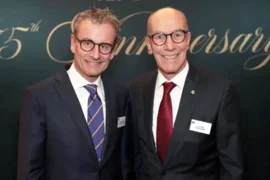 |
 |
|
EUSA Newsletter 01-2025, ISSN 1855-4571
|
EUSA is extremely excited to announce that the registrations for the European Universities Championships 2025 are now officially open! Next year, between the months of June and September, student-athletes engaged in their higher education studies at European universities will be able to attend the events and compete in their chosen sports. Today also the registration for international volunteers opened, offering them a chance to actively contribute to the organisation of the events. Following this year’s very successful European Universities Games in Debrecen-Miskolc, Hungary and the European Universities Rowing Championship in Zagreb, Croatia, we look forward to welcoming university teams from all over Europe taking part in the 18 sports events next year, for a total of 24 sports competitions: 3x3 Basketball, Badminton, Basketball, Beach Sports (Beach Handball and Beach Volleyball), Chess, Combat Sports (Judo, Karate, Kickboxing, Taekwondo), Football, Futsal, Handball, Orienteering, Rowing, Rugby 7s, Table Tennis, Tennis, Volleyball, Water Polo, and Padel - for the first time in EUSA EUC history. In December, the Winter Sports (Alpine Skiing, Snowboarding, Snow Volleyball) Championships will also be held for their second edition. The European Universities Championships are licensed by the European University Sports Association (EUSA), and are organised in cooperation with the local organising committees in different cities around Europe, offering great competitions and ever-lasting memories. EUSA is proud of the fact that all events are open to men and women. Current students and recent graduates from European universities aged between 17 and 30 are eligible to take part. National university sports bodies in 47 countries in Europe are invited to submit the initial registrations - general entry forms as soon as possible. The deadline to register is February 15 for sports which start in June and July, and March 15 for sports which start in August and September. Registrations for Winter Sports will open in Spring. Please see the EUSA Championships page for a general overview and the specific event pages for details. Contact the national university sports body in your country to check additional legibility criteria and entry procedures. At the same time, we also invite volunteers to register their interest to take part in the sports events and contribute to the organisation of the championships. Here, you can get more information and register; with the same deadlines to apply - February 15 for sports which start in June and July, and March 15 for sports which start in August and September. More information...
EU Commission 2024-2029 mandate starts
01 December 2024
|
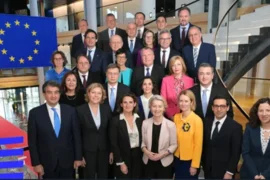
|
|
Today, the mandate of the 2024-2029 college of the European Commission, under the second Presidency of Ursula von der Leyen officially starts and the new Commission takes office.
|
EUC Badminton to be hosted by Madrid in 2025
02 December 2024
|
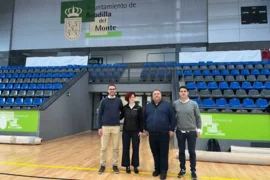
|
|
The city of Madrid in Spain, will be hosting the European Universities Badminton Championship in 2025. The event will take place next summer from 22-28 June.
|
EUC Water Polo coming to Vukovar in 2025
02 December 2024
|

|
|
The city of Vukovar in Croatia, will be hosting the European Universities Water Polo Championship in 2025. The event will take place next summer from 7-13 July.
|
EUSA commemorates International Day of Persons with Disabilities 2024
03 December 2024
|
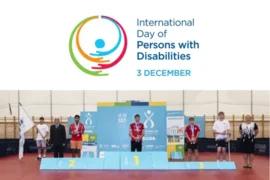
|
|
December 3 is the day that marks the International Day of Persons with Disabilities, with EUSA continuously increasing its efforts to including sports competitions for student-athletes with disabilities at its events.
|
Cedric Terret re-elected as FFSU President
04 December 2024
|
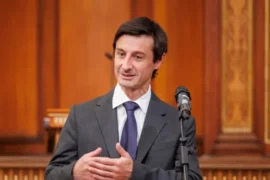
|
|
French University Sport Federation (FFSU) held its Federal Elections from November 25, 2024, to November 29, 2024, and re-elected Mr Cedric Terret as President of the association.
|
EUSA mourns the loss of Mr Nigel Mayglothling
04 December 2024
|
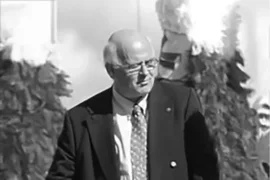
|
|
We regret to inform you that Mr Nigel Mayglothling, former EUSA Technical Delegate for Rowing, has passed away.
|
EUC Futsal headed to Zagreb in 2025
04 December 2024
|
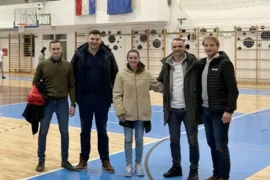
|
|
The capital of Croatia, Zagreb will host the European Universities Futsal Championship in 2025. The event will take place next summer from 17-25 July.
|
Happy International Volunteer Day 2024
05 December 2024
|
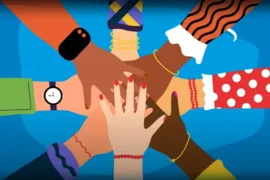
|
|
International Volunteer Day is celebrated each year on December 5, with the European University Sports Association extending its utmost gratitude to the numerous volunteers who have and are contributing to the success of the organisation and are representing one of the greatest supports on many EUSA events.
|
EUC Table Tennis to be held in Burdur in 2025
05 December 2024
|
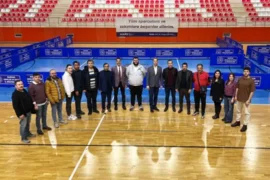
|
|
The city of Burdur, Türkiye will be hosting the European Universities Championship in Table Tennis, in 2025. The event will take place next summer from September 11-16.
|
Become a Volunteer for EUSA Championships 2025!
09 December 2024
|

|
|
The European University Sports Association (EUSA) invites volunteers from December 15th, to register their interest in taking part in the next summer's EUSA European Universities Championships 2025, contributing to the organisation of these unique sports events.
|
EUC Basketball to be hosted by Bologna in 2025
09 December 2024
|
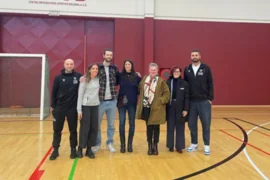
|
|
The city of Bologna in Italy will host the European Universities Basketball Championship in 2025. The event will take place from 6-13 July 2025.
|
FUSION project kicks off in Ljubljana
10 December 2024
|
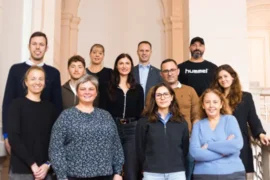
|
|
With the goal of inspiring graduates to sustain active, healthy lifestyles post-university, the much-anticipated project Future links for University athletes with Sports clubs Integrating Organised Networks (FUSION) officially kicked off on December 7th, 2024, in the prestigious Rectorate of the University of Ljubljana.
|
EUSA and European Rowing working towards future cooperation
10 December 2024
|
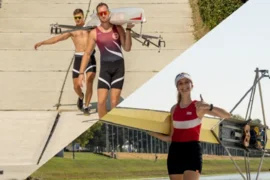
|
|
An online introductory meeting with representatives of European Rowing and the European University Sports Association (EUSA) was held on December 9, discussing possible cooperation and activities.
|
EUSA-NUSA online meeting - December 2024
11 December 2024
|
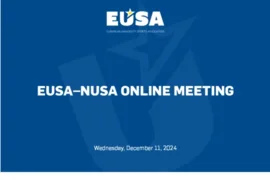
|
|
On December 11, 2025, the European University Sports Association (EUSA) hosted an insightful EUSA-NUSA online meeting in the form of a webinar, having as the main topic the upcoming European Universities Championships 2025, the schedule of the next EUC 2027 and European Universities Games of the future, EU Projects and funding opportunities, as well as relevant updates from the organisation.
|
EUC Combat Sports coming to Warsaw in 2025
12 December 2024
|
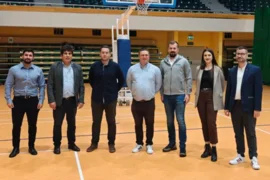
|
|
The city of Warsaw in Poland will host the European Universities Combat Championship in 2025. The event will take place from 22-25 August 2025.
|
Fit4Green partners meet online
13 December 2024
|

|
|
Partners of the Fit For Green (Fit4Green) project met online on Thursday, December 12, for an update on co-creation workshops with young participants and to follow-up on the programme planning phase of the local events coming up in the spring.
|
EUC Orienteering headed to Lodz in 2025
16 December 2024
|

|
|
The city of Lodz in Poland will host the European Universities Combat Championship in 2025. The event will take place from 24-27 July 2025.
|
Second Women’s Handball Conference held in Vienna
16 December 2024
|
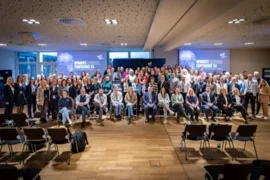
|
|
The second EHF Women's Handball Conference, exploring pathways 'From grassroots to professional sport and beyond,' took place in Vienna on December 10-11, alongside the Women's EHF EURO 2024.
|
Erasmus+ Sport Info Day 2025
17 December 2024
|
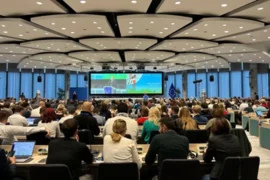
|
|
On December 16, the European Education and Culture Executive Agency (EACEA), in cooperation with the Sport Unit of the Directorate-General for Education, Youth, Sport and Culture (DG EAC), organised the Erasmus+ Sport Info Day 2025.
|
Grassroots & Social Sports Training in Warsaw
18 December 2024
|
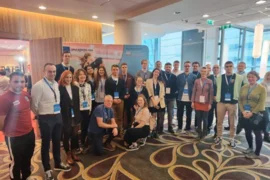
|
|
From December 11 to 13, Warsaw hosted the Grassroots & Social Sports: Education, Inclusion, Development training organised by SALTO-YOUTH (Support, Advanced Learning and Training Opportunities for Youth).
|
EUC Beach Sports headed to Granada in 2025
18 December 2024
|
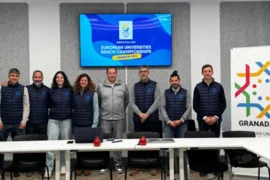
|
|
The city of Granada in Spain will host the European Universities Beach Sports Championship in 2025. The Beach Handball event will take place from 14-17 July 2025, while Beach Volleyball from 14-19 July 2025.
|
2025 EUSA Greetings
20 December 2024
|
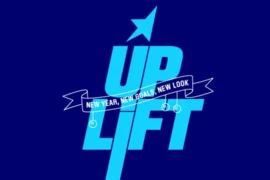
|
|
IN 2025 TOGETHER WE WILL REACH EVEN GREATER HEIGHTS! Let's embark on a journey of setting new goals, breaking records, and inspiring each other to soar. We wish you a joyful 2025!
|
XXVII International Student Christmas Tournament
23 December 2024
|
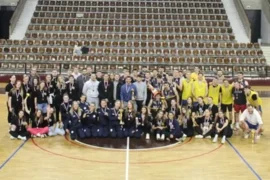
|
|
This year, the International Student Christmas Tournament, also known as Vedran Jelavić Memorial Tournament, has reached its 27th edition of being organized in Dubrovnik, Croatia.
|
|
 |
| FISU Section |
|
|
 |
| Important Dates Coming Up |
|
 |
| What's up! - Student Column |
Should esports be considered a sport?
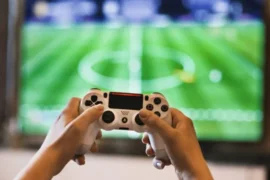 In this month’s What’s up student column, our EUSA ESC volunteer Markus Schneider shares his research and viewpoint on the topic related of esports. In this month’s What’s up student column, our EUSA ESC volunteer Markus Schneider shares his research and viewpoint on the topic related of esports.
The IOC’s decision to launch the Olympic Esports Games in 2025 highlights the growing relevance of esports on the global stage. At EUSA, we’ve observed this rise with interest, particularly as some of our partners have already embraced esports initiatives. This shift has inspired me to explore how esports could align with our future events and goals.
As someone who enjoyed his fair share of gaming in the past and is now volunteering in the field of (university) sports, I believe esports should be considered to be officially recognised as a legitimate sport.
In a past What’s up article, Alessandro Boscherini, who EUSA had the pleasure of having as an intern, already delved into the topic of esports. In his article he explores the growing significance of esports, tracing the evolution of esports from its origins in the 1972 *Spacewar* tournament to its current status as a lucrative industry with significant cultural and social impact, particularly among younger generations. Alessandro concludes that despite its rapid growth and community-building potential, esports faces challenges such as a lack of global regulation and skepticism from some countries but continues to foster inclusion and new forms of social interaction both online and offline.
Although esports are more popular than ever, partially due to the Covid-19 pandemic, the debate about esports’s legitimacy as a sport has not come to a consensus. In this month’s What’s Up article, Markus will dissect the arguments against recognizing esports as a legitimate sport.
The debate of whether esports should be recognized as sports, however, goes beyond mere semantics. It could provide a foundation for safeguarding practices within esports, addressing concerns over unhealthy habits often cited by critics. By fostering a healthier and more regulated environment, official recognition would not only help players but also lead to greater societal acceptance of this burgeoning field.
Lack of Physicality
By far the most often brought-up argument against esports being recognized as a legitimate sport is its lack of physicality. esports players are often unfairly stereotyped as lazy or antisocial, because the majority of video games do not require a lot of movement and/or face-to-face communication.
And although physicality is what most people use to define a sport, a lot of sports that also lack physicality are strangely still perceived as sports:
Mind Sports
Chess – Governed by the International Chess Federation (FIDE), recognized by the International Olympic Committee (IOC).
Bridge – A card game overseen by the World Bridge Federation (WBF), also IOC-recognized.
Precision and Skill-Based Sports
Billiards/Pool – Includes snooker, eight-ball, and nine-ball, overseen by various governing bodies like the World Pool-Billiard Association (WPA).
Bowling – Governed internationally by the International Bowling Federation (IBF).
Darts – recognized under the World Darts Federation (WDF).
Shooting – focused on precision and governed by the International Shooting Sport Federation (ISSF).
Archery – while requiring some physical skill - is predominantly about precision and focus under the World Archery Federation (WA).
Such sports have cognitive abilities, fine motor skills, or strategic thinking as their primary elements. esports fall exactly under such sports, but they don’t seem to get the same amount of recognition and support.
Nevertheless, the aspect of players' health should not be disregarded, as current data suggests that a large number of pro esport players do not engage in enough physical activity. Survey data from a study by DiFrancisco-Donoghue (2019) reported that more than 40% of their esports athlete participants did not engage in any forms of physical exercise or activity. Additionally, for those who did exercise, it might not be enough to undo the negative health effects of prolonged sitting. It seems that in this regard, (professional) esports still need to improve.
But doesn’t undermining esports legitimacy as a sport just further condone unsafe practice?
Underestimating (semi-)professional esports
Many individuals find it difficult to approach esports players and traditional sports athletes with the same level of respect for their skills. However, the parallels between, for example, a chess grandmaster and a professional esports athlete are striking. Both excel in their respective domains through rigorous training, sharp strategic thinking, studying opponents’, and performing under immense pressure. Just as chess has earned recognition as a mind sport, so too should esports for the discipline and expertise it demands.
In my opinion, people tend to underestimate the dedication and professionalism needed to compete in high-level esport events while disregarding the discrepancy between casual gaming and pro-level esports. The difference would be comparable to someone who casually plays football twice a week with friends and someone who plays at a (semi-)professional level and (has to) trains five to six times a week. One article highlighting the demanding schedule of professional esports players states: "For nearly 8 hours each day, professional players practice at their game of choice over and over.”
Just like athletes in traditional sports, esport athletes have to follow a strict schedule for up to six days per week. While training their gaming skills is one part, having a balanced diet and sufficient physical activity is also part of their schedule. Furthermore, coaches are responsible for guiding and mentoring esports gamers, helping them to reach their potential. They work closely with teams or individual players to develop strategies, identify weaknesses, and build on existing strengths—mirroring the responsibilities of coaches in traditional professional sports.
The Controversy Around "Killergames"
One of the most contentious aspects of esports is the prevalence of so-called "killergames"—shooter games that often involve graphic violence. Critics worry that these games could negatively impact players, particularly younger audiences, by fostering aggression or desensitization to violence. However, the reality is more nuanced and grounded in ongoing research.
Studies have yet to provide conclusive evidence that shooter games directly lead to violent behavior in players, especially once they reach a certain level of maturity. While games involving intense action can trigger short-term stress responses, research suggests that the human brain is generally capable of distinguishing between virtual scenarios and real-world actions. Adults, in particular, show a clear ability to separate the fictional nature of these games from reality.
The concern is more significant, however, for younger children, whose cognitive development and ability to differentiate between fantasy and reality are still evolving. While comprehensive studies on the long-term effects of exposure to shooter games on children remain limited, caution is warranted. This is particularly true given the already aggressive tone that often characterizes communication in certain online gaming communities, which can amplify negative experiences for younger players.
When it comes to legitimizing esports, some people fear that “killergames” become more and more normalized and that their potential dangers to younger individuals are further disregarded.
But instead of refusing to acknowledge esports, the key lies in nurturing safeguarding practices. Shooter games are probably here to stay, and so are the young players who may inevitably come into contact with them. Recognizing esports as a legitimate domain would help establish structured environments, where competitive gaming takes place under ethical oversight and with an emphasis on player well-being. These safeguarding practices can then be disseminated to the rest of the gaming community, ensuring better protection of especially younger players.
In conclusion, recognizing esports as legitimate sports is not just about semantics—it’s about fostering a healthier and more inclusive environment for players, combating unfair stigmas, and unlocking opportunities for institutional support and public funding. Professional esports demand the same level of discipline, strategy, and dedication as many traditional sports, and formal recognition would only help to further legitimize and safeguard this rapidly growing field.
Even for those who may not consider esports a “sport,” it’s undeniable that promoting healthier practices and fair treatment is in everyone’s interest. By at least embracing esports as a legitimate cultural phenomenon, we can pave the way for a better gaming culture.
The author of the article Markus Schneider comes from Germany, is currently engaged as a European Solidarity Corps (ESC) volunteer at EUSA. In 2024, he finished his secondary education, and is about to get engaged in university education.
Are you a student with an opinion? We are looking for new contributors for our student column every month. Feel free to contact stc@eusa.eu to offer a piece or propose a topic.
read more >>
Your Data and Privacy:
EUSA GDPR: General Data Protection Regulation
Published by:
European University Sports Association (EUSA)
Office: Tomšičeva ulica 4, SI-1000 Ljubljana
Realisation/Main editor: Andrej Pišl
tel: +386 1 256 0056, web: www.eusa.eu
social: Facebook | X | Instagram | Threads | YouTube | LinkedIn | #eusaunisport #myeusa
|
 European University Sports Association European University Sports Association 
|
|




























